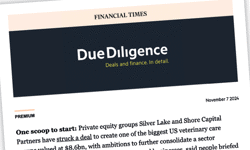They used to call classified advertising "the rivers of gold" that flowed into regional newspapers and turned them into profitable, highly desirable businesses.
No one is talking about rivers of gold anymore. Indeed the worry is now much more about classified as an endangered species as the industry faces its deepest recession for generations.
There has always been an advertising cycle, but rather like weather patterns, the cycle has always turned and you could rely on the good times coming back.
Previous threats
And indeed, apart from the cycle, the paid-for regional press has survived previous threats that were supposed to bury the business - such as freesheets and commercial radio.
There has also been competition for car ads from Auto Trader, and new rivals in the private-goods for sale segment, first from car boot sales and then online auction sites like eBay.
New threats appear all the time such as local government either putting its job ads online or changing the pattern of advertising.
In Northern Ireland, for example, the three daily papers, the Belfast Telegraph, the Belfast Newsletter and the Irish News had to go to court to stop Northern Ireland government vacancies being advertised only in the Daily Mirror.
"The big threat to job ads now is really government and public sector jobs and the fact that local councils and central government seem to be continually threatening to take more jobs out of newspapers and put them online or onto their own websites," warns Ed Curran, editor-in-chief of the Belfast Telegraph.
But despite individual threats to newspaper classifieds over the years, there has been nothing quite like the current market for classified advertising.
Impact of recession
The sharpest recession in living memory has combined with the continuing leakage of classifieds to the internet to produce the perfect storm.
"Over the last year, for obvious macro-economic reasons, you are looking at year-on-year drops of 20% or more. It is a very, very large drop. On occasions, in particular parts of the country, you are looking at 30% but in general it is 20% plus," says Roger Parry, non-executive chairman of Johnston Press.
The pattern is all too clear and the causes obvious, almost mundane. People are not selling their homes, or buying cars and employers are not creating new jobs.
Then, according to Parry, the comparisons happen to be particularly cruel. This would always have been a miserable time because of the downturn but things look dramatically, doubly bad because it comes at the end of an "aberrational" boom in both housing and local authority job creation.
"Life is looking extremely tough and every single regional publisher is in the same boat and they are all having to make significant reductions and pull in their horns in a very major way," says Parry.
Precipitous drops
The full horror of what is going on out there was revealed in a trading statement from Daily Mail and General Trust in September which spoke of a rapid deterioration in trends in July and August at Northcliffe, its regional newspaper arm. Property and recruitment were hit worst but overall, comparable advertising revenues were down by 22%.
"In those months", DMGT stated baldly, "property revenues were 45% below the prior year and recruitment revenues were down 28%. September has seen a slight further deterioration in these trends with advertising revenues down 24%."
DMGT was not alone. In the first half of the year, before the recession really began to bite, Trinity Mirror reported that in its regional titles, jobs were down 6.4%, houses 12.6% and cars by 17.6%. Results will have almost certainly have deteriorated since then.
John Fry, chief executive of Archant, who will become chief executive of Johnston Press in January, has not worked in the newspaper industry all his life but has still been shocked by the suddenness of the current downturn.
"We looked back at the early 1990s and it was much more spread out. Then it started with people losing their jobs and that caused the property market to collapse and it took several years to recover," says Fry.
The Archant executive describes the latest setback as a "vicious downturn" because the end of the property boom has become tied up with the credit crunch and the banking crisis. Never mind the precipitous decline in property sales, he explains, if you know someone who has lost their job they are hardly likely to rush out to buy a new car. And if readers are not moving house they are much less likely to buy a new three-piece suite.
For Fry and other regional newspaper executives, the logic and the strategy are both inescapable though tricky to pull off: you have to cut costs to match existing circumstances – while continuing to invest in the future.
"When you have a transition going on like the internet, it would be fatal to ignore that because otherwise you will wake up with a bad headache," warns Fry.
Cyclical or structural?
The biggest question of all is the extent to which the current downturn is cyclical or structural. Will there at least be trickles of gold coming back to the newspapers when the current crisis is over or will it all leak away to the internet?
Many heads are being scratched at the moment on the issue and no one knows for sure but there seems to be a consensus among executives that around 80% of the decline is cyclical and might potentially return and 20% is down to the internet. But there again, most large newspaper groups have either set up, or bought their own online classified sites, rather as they once protected themselves against competition with a ring of free newspapers.
The present state of classified has greatly damaged the reputation of the regional press in the City and share prices have plummeted as a result.
"If you are in the fortunate position of being family owned with a solid balance sheet then yes you can just strip out costs as best you can and wait for the recovery in the UK media market. It is that much more challenging if you are in public markets," says Paul Richards of Numis Securities.
He is critical of Trinity Mirror because it is "being run for margins" and of Johnston Press because of the flurry of deals in 2005 that included the Scotsman and Belfast Newsletter and greatly increased the company’s debt.
The only newspaper group Richards is positive about at the moment is DMGT, partly because half the company is in B2B operations and partly because of the strength of the Daily Mail.
"The rivers of gold have probably gone and they are not going to be coming back. People will still read national newspapers. It’s a dinosaur with a long tail but the regionals are going to be much more challenged," the stockbroker argues.
Fighting back
Can anything be done now about classifieds in the depths of recession? A look at the recent experience of the Hull Daily Mail, which in the past twelve months has won prizes for editorial, advertising and online, suggests there is.
"We are working hard with sales to understand the credit crunch and such things as distress purchases. People are still going to have to replace their washing machines if they break down," says Judy Ward, marketing director of the Hull Daily Mail.
"We have not stopped developing. We are creating a regional B2B site called Humber Business", continues Judy.
At the coal face, there has also been innovation in how classifieds are bought and sold.
"Difficult circumstances yes, but that does give me an opportunity regionally," says Darren Minns, Northcliffe’s north east regional director for private and recruitment ads.
At the moment, he is working on a trial for the group on trying to win back ads for part-time jobs, or positions just above the minimum wage – a category largely lost to newspapers on cost grounds.
Minns is experimenting with what he calls Recruitment Solutions, linking the advertising cost to the salary of the job and the difficulty of the search – rather like a recruitment agency.
"We need to be creative with our products," says the Hull-based executive.
The paper has largely managed to hold onto its 40-50% share of local authority job ads in its region - Hull, Grimsby and Lincoln. In addition to the paid-for print ads, the council can also promote online the jobs that were only previously advertised internally or in other media.
"We have got them all on our website. That pleases the local council, delivers a good response to them and they continue to spend with us," says Minns.
The Hull paper also countered the loss of the private market to eBay by setting up a free online Stuff For Sale service – which now attracts 15,000 unique visitors a month and 240,000 page impressions a week in Hull alone.
"We have allowed people to use that as a free online listing. We are not in it for the money. We are in it for the interaction with our local audience so therefore people continued to buy and sell in our area through print and Stuff online," says Minns who believes that free ads in print are of value to a publication.
Obviously everyone must fight for every ad they can bring in – particularly at the moment.
But what of the bigger picture?
At one level of the newspaper market, Ed Curran believes that circulations, and advertising revenues, of very local, rural newspapers will probably continue to hold up well because they are less impacted by the internet.
As for the rest, the newspapers or companies that are able to offer an advertiser a choice and a range of platforms, will emerge strongest. The range of platforms may include radio and online as well as paper.
"I don’t think we can keep all our eggs in the one basket of the newspaper," concludes Curran.
Roger Parry is already thinking about a future after the current recession ends. He concedes that a website is, in many ways, a better classified advertising medium than a paper, so therefore action is vital.
At the moment, the proportion of classified advertising lost to the internet may have been relatively small. But what happens when the revenue tide comes back in and much more of the incoming tide goes up the channel marked online than to the channel marked print?
You would have to be an ostrich buried entirely in the ground to ignore such a threat, Parry believes.
"To minimise the current damage, you have to aggressively manage your existing cost base. To solve the structural problem in the future, you have to make sure that your classified web offering - the jobs, the houses, the cars, the local search is at least as good and preferably better than anyone else’s," says the Johnston Press chairman.
The long term future of the regional press could depend on it.
FEATURE
The Incredible Disappearing Classifieds
The continuing impact of online, coupled with the looming recession, has had a devastating impact on newspaper classifieds. The question, says Ray Snoddy, is will they return when the economic sun shines again, or are they gone for good.










